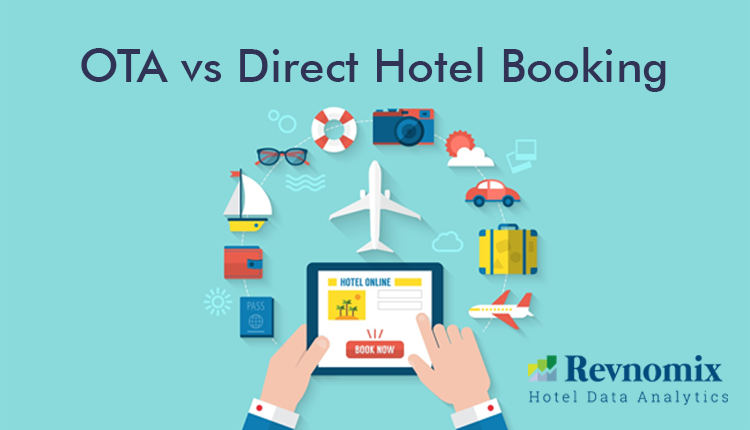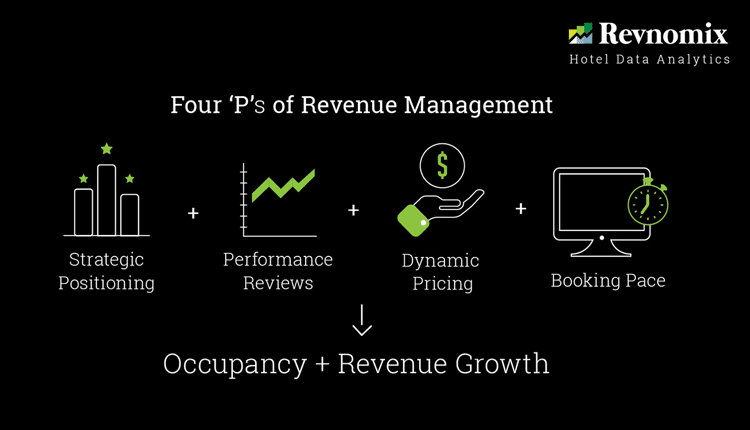All of us have varied views on this subject – while there is no doubt OTAs bring in the business, at what cost? Can hotels do a turnaround to make the guests book directly? Let’s dig into the history of both these channels and the evergreen debate.
OTAs vs. Direct Hotel Booking
What is OTA?? Before moving further, let’s understand a little about it.
As the name says, OTA or Online travel agencies are online platforms that allow consumers to e-book travel-related facilities directly via the Internet without any delay. Simply, OTAs are the intermediaries that connect guests with hotels and take a small fee in the process. The concept of OTA evolved in 1996, in the USA when Microsoft launched Expedia Travel Services and very quickly gained popularity due to good work and huge branding. Also, the lack of transparency in the traditional system is another reason that ushered in the popularity of OTA. The stepping of OTA formed a collegial relationship between travelers resulting in an immediate option for travelers to book a room resulting in more and more hotel listings on OTA platforms.
On the other hand, Direct bookings are those where guests can book directly through a hotel’s website, phone call, email, social media, etc. The guest might have found the source through an advertisement, have seen or know the hotel in person, or might have checked the hotel on the OTA platform but decided to book directly.
OTAs vs Travel Agents
Remember the time when we use to book our tickets through a travel agent? Yes! The Travel Agent, who use to do all the travel-related jobs starting from booking a hotel room to arranging every minute facility related to the travel plan. A travel agent is a person who simplifies the travel plan process for their customers.
Making travel plans through a travel agent is beneficial for clients who plan multi-destination or international trips. Also, often travel agents get rid of unpublished offers and activities that are beneficial for the traveler. But in recent times the number of travel agencies is decreasing because of the sturdy online presence of the providers (hotels, airlines) themselves. OTA’s are gradually taking place of physical travel agents.
Also Read: what gets measured, get managed- online business
OTA Share of Hotel Bookings
Now the majority of hospitality providers are moving their business to OTA platforms, customers now can compare at a one-step store before making the purchase. Since the introduction of OTA in the mid-’90s, they have increasingly won a huge market percentage, presently capturing 39% of the US online digital marketplace and forecasts anticipate that this will continue attaining 41% of the market percentage in the US for OTAs in 2020. OTAs use distinctive models, from reselling stock they’ve already purchased or a commission-based model. Commissions can attain as high as 30%. It is this high level of commissions that has caused the latest hotel wars between brand name chains and OTAs, with the previous investment in campaigns to encourage direct bookings through their websites, such as the “Stop clicking around” campaign by Hilton.
Agents vs Online booking statistics
While looking at the modern online travel agency market share, agents and partners had been 24. 3%, marketplace bookings were simply 9. 1% and direct bookings had been 66. 7%. According to the tour trends from 2017, those direct bookings are down from 79. 2% and travel agencies are up from 17. 5%.
Key Statistics:
- The travel & tourism industry is well worth a massive $1. 2 trillion
- In 2017 online direct bookings were 79.2%, agents and affiliates were 17.5%, and marketplace bookings were just 3.2%.in 2018 virtual travel income worldwide hit $694 billion, and $194. 4 billion changed was from the US.
- 15. 4% increase in worldwide digital travel sales and 10.3% rise in hotel digital booking bookings in 2019.
- maximum bookings come directly with 66. 7% of general bookings, marketers, and associates account for 24. 3%, with market bookings contributing nine. 1%.
- agent, associates, and local tourist offices bookings elevated from 17. 5% to 24.3% in 2018.
- By 2022 the worldwide marketplace extent for online hotel booking is probably to exceed $174 million.
- 700 million people will be booking their hotel rooms online by 2023.
- Millennials prefer to book hotels via travel agencies but 52% browse the hotel’s website for more information. 82% of all travel bookings in 2018 were made online via a mobile app or website, without human interaction.
I want expert revenue management
Why does the hotel prefer direct booking?
Although OTAs are helping to increase the hotel business yet hotels prefer direct booking.
- Direct relationship with the client: The hospitality business is all about maintaining a cordial relationship with the client. Involving a mediator is not often the best way to enhance communications or understanding. 18 months ago when booking. Com announced that it would now not pass visitor information and email addresses to hotels. That creates a form of relationship-blocker and reduces a hotel’s capability to identify, recognize and serve their client. To avoid such circumstances, hotels prefer direct booking.
- A personalized website: even though OTA offers a plethora of accommodations to pick from, the basic issue they lack is the appearance. A website offers a personal identification to a hotel and the scope of customization is usually very excessive at the website. Choosing a room is relatively simpler through direct bookings than via OTAs. Many times the pictures in the OTAs are not proportional to the original one.
- Loyalty: It is always beneficial for hoteliers when they have loyal customers, in the sense, that they keep on coming repeatedly because they trust the hotel’s service and rely on them. It also becomes inexpensive for hoteliers to encourage a repeat visit rather than looking for a new customer. Loyalty matters a lot for hotels and this is possible to achieve when there is direct booking. Furthermore, it is feasible to supercharge a loyalty program by including extra visitor information. This could be on-website behavior collected thanks to a direct reserving.
- Active choice: Founder of joie de vivre hotels and Airbnb board member, Chip Conley found a clear connection between client satisfaction and direct bookings. He explains in Peak how OTA-bookers are much more likely to make a well-informed active choice to live at a hotel. They’re regularly not from the target audience and have less favorable for the ethos of the hotel;
Direct bookings are what give better revenue for hotels!
- Lose guest behavior learning due to AI and MI: The increase in machine learning and artificial intelligence holds a great aspect as a tool to increase loyalty, conversion rates, and customer service. The impact may be one or two years away, but these techniques will be increasingly important and they have the most impact on the first-party data. Most data owned by hotels, the better they will provide a personalized experience. If guests do not research and order on the hotel website themselves, the opportunity to learn from guest behavior and countable desires may be lost forever.
- High commissions cash out: Hotels pay around 15-25% of front-line revenue in commissions, high are slurping cash out from the industry. This cost reduction can be invested in improving services. This is usually the most quoted reason for the obsession of hotels with direct bookings.
How do increase direct bookings for hotels?
There’s no denial of the fact that OTA gives more business to hotels. However, increasing direct booking is beneficial for the simple fact that it will reduce the cost of OTA intermediation.
Given the extensive market size and share of third-party ordering sites, it is increasingly important for the hotel to maintain the right balance between OTA’s orders and direct ordering.
Let’s count a few hotel direct booking strategies which would be also one of the rewarding tasks for any hoteliers.
Also read: Increasing direct booking in a hotel
I want to know your pricing
Optimize your website: The hotel’s website plays a major role in increasing direct bookings. It needs to be visually good-looking, easy to navigate, and accessible. It must be properly optimized for search engines. This makes the hotel website more visible on search engines, so attracts increased visitors. Also, using relevant content on the website helps to collect organic traffic. Most importantly, the hotel website must be mobile-friendly. Because bookings that come from mobiles are expected to take around 35% in 2018 which is a substantial leap considering that it is 8% to New 2017. The reservation telephone number or letter ID should be clickable on all pages which will help guests to click and call or put an inquiry to the reservation desk directly from the phone. A call to action button also helps.
Including booking engine in the website: Availability of real-time information is one of the easiest ways to improve hotel bookings directly. Integrating a web booking machine to the website allows visitors to your website to check room availability in real-time which will also help the guests to receive instant confirmation of their booking directly from the PMS hotel. This increases the confidence of guests in the hotel’s honorary toward their reservations
Promoting good guest reviews on the website: Nearly 98% of guests read hotel reviews and 80% of them assume they are very important before making a final reservation. Nice reviews can affect traveler booking decisions in a great way. This is why it is important for a strategic position and promoting positive guest reviews on the website. It must be seen throughout the page until visitors are made with the entire order process.
Entice your website visitor with offers or freebies: Freebies are always attractive. How many times we have shopped something because of that pop-out freebie message. In the hotel business too, introducing a freebie can drive more direct bookings. When visitors are on the website, interesting offers can compel them to order directly. Mentioning the type of perks they are entitled to when booked directly will coerce them to place a direct order. Here is some examples – ‘book with us directly & get a 10% discount for your Bill F & B’, ‘Book with us directly to take advantage of an easy room upgrade facility’ etc. Everyone wants more and hotel guests are not an exception to this. According to Skift, around 45% of travelers consider offers and important benefits to placing an order.
Use efficient techniques and strategies to increase your hotel bookings!
Handling booking exit tactfully: Many times, guests leave the page on the search stage. They come to the booking page and after entering all the details just leave the page which is not good for a hotel. For this not to happen, guests’ insights need to be collected from the journey made on the website. A concern mail may help to drive back their interest to confirm the booking. Offering a complimentary break along with the reservation done may make them feel warm and a sense of personalization which will bring them back to the booking.
Offering loyalty programs: Introducing loyalty programs is another way to increase direct bookings. Incentivizing the guest with loyalty points which can be redeemed not only at the particular hotel but also at their different outlets can attract the guests towards direct bookings and bookings which will also help you with the long-term association.
Enable booking via Facebook: When offered the easier booking process to travelers through social media platforms like Facebook, it will help to drive more guests to book directly with hotels. Executing a booking engine that can be integrated with your hotel’s Facebook page will help to increase direct booking.
Grow your presence on metasearch engines: According to Trivago, around 50% of all online bookers use Meta Search to find their ideal hotel, and this trend will rise in the coming years. Metasearch machines help travelers make hotel reservations that are informed by allowing them to compare the prices of hotels listed in several Ota. It also shows the prices mentioned on the hotel website. It asks a traveler to visit the hotel brand website, so it encourages them to order directly.
Also read: Improve OTA Listing and Positioning
Get in touch
OTA vs direct hotel booking will always be there and shortly usage of OTA may increase over direct booking. OTAs reduce manual work by driving more business. At the same time, hoteliers will still look for prospects to increase direct bookings. Little initiative steps can help to increase direct bookings for the hotel which will also build the credibility of the brand. A proper strategic plan can help to drive guests for direct bookings.







